Most Ambiguous Quotes & Sayings
Enjoy reading and share 38 famous quotes about Most Ambiguous with everyone.
Top Most Ambiguous Quotes

By the time the average person finishes college, he or she will have taken over 2,600 tests, quizzes, and exams. The right answer approach becomes deeply ingrained in our thinking. This may be fine for some mathematical problems where there is in fact only one right answer. The difficulty is that most of life isn't this way. Life is ambiguous; there are many right answers- all depending on what you're looking for. But if you think there is only one right answer, then you'll stop looking as soon as you find one. — Roger Von Oech

... our generation hasn't made any meaningful contribution to the field. We have promoted atheism, displayed agnosticism (which amounts to an ambiguous shoulder shrug), or, in most cases, been eerily silent. — Gudjon Bergmann

Some persons never attain to the happy art of perspicuous expression, and it is equally true that some persons, thro' a mental defect of their own, will judge the most correct and certain language of others to be indefinite and ambiguous. — Oliver Ellsworth
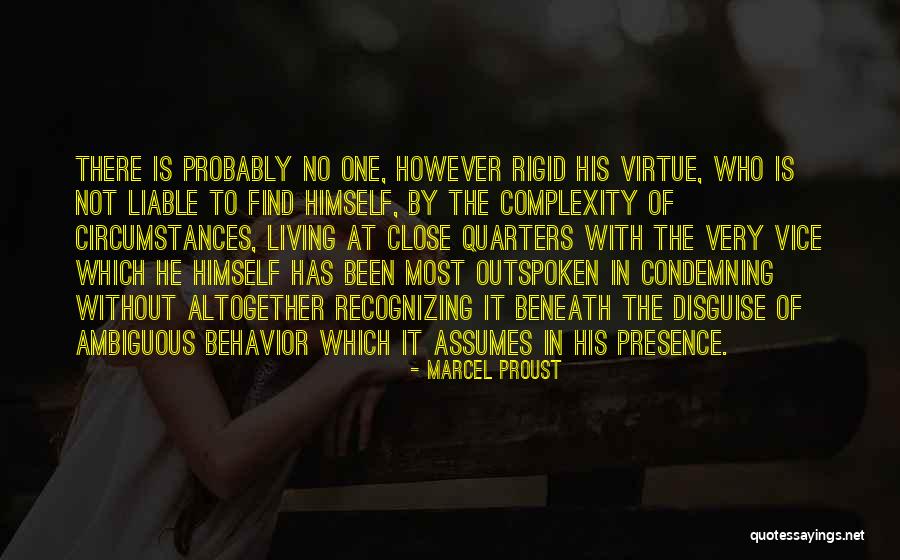
There is probably no one, however rigid his virtue, who is not liable to find himself, by the complexity of circumstances, living at close quarters with the very vice which he himself has been most outspoken in condemning
without altogether recognizing it beneath the disguise of ambiguous behavior which it assumes in his presence. — Marcel Proust
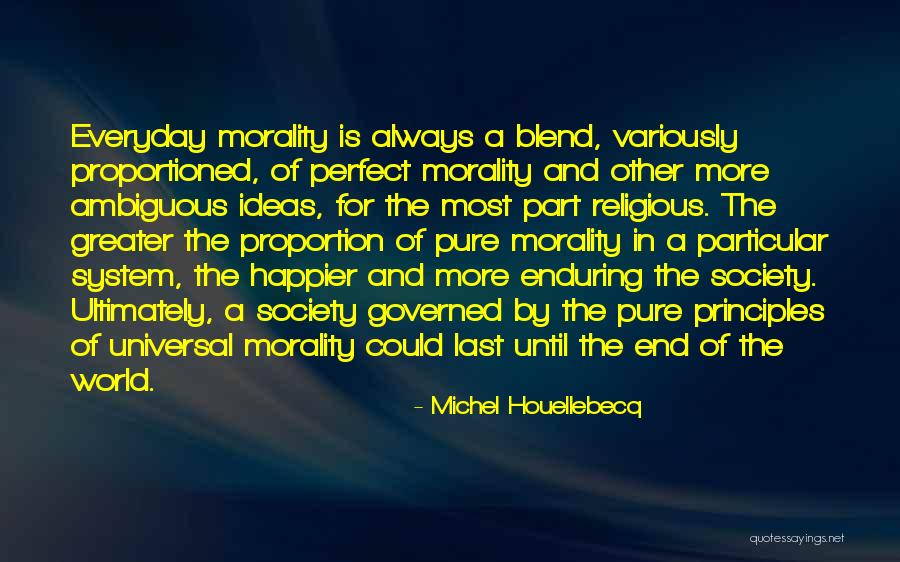
Everyday morality is always a blend, variously proportioned, of perfect morality and other more ambiguous ideas, for the most part religious. The greater the proportion of pure morality in a particular system, the happier and more enduring the society. Ultimately, a society governed by the pure principles of universal morality could last until the end of the world. — Michel Houellebecq
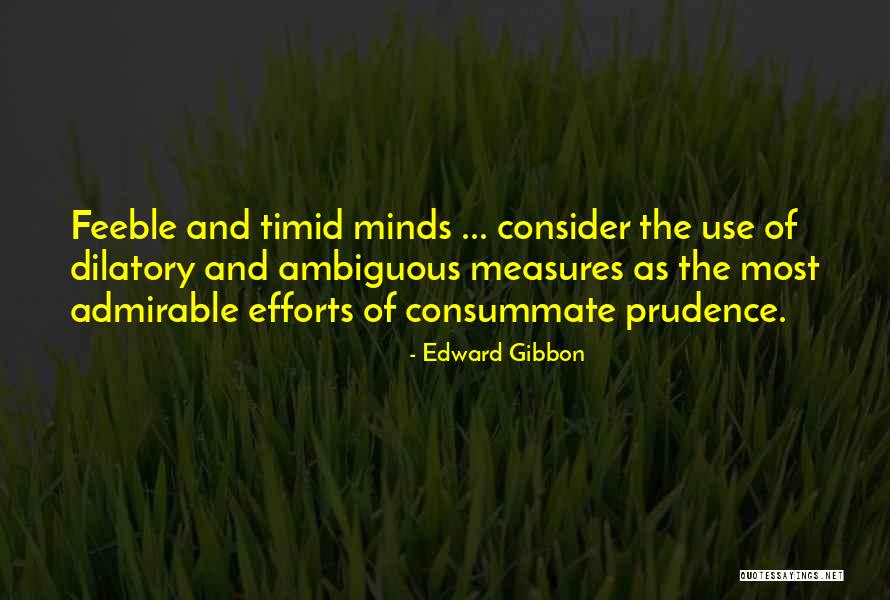
Feeble and timid minds ... consider the use of dilatory and ambiguous measures as the most admirable efforts of consummate prudence. — Edward Gibbon

Among the words that can be all things to all men, the word "race" has a fair claim to being the most common, most ambiguous and most explosive. No one today would deny that it is one of the great catchwords about which ink and blood are spilled in reckless quantities. Yet no agreement seems to exist about what race means. — Jacques Barzun
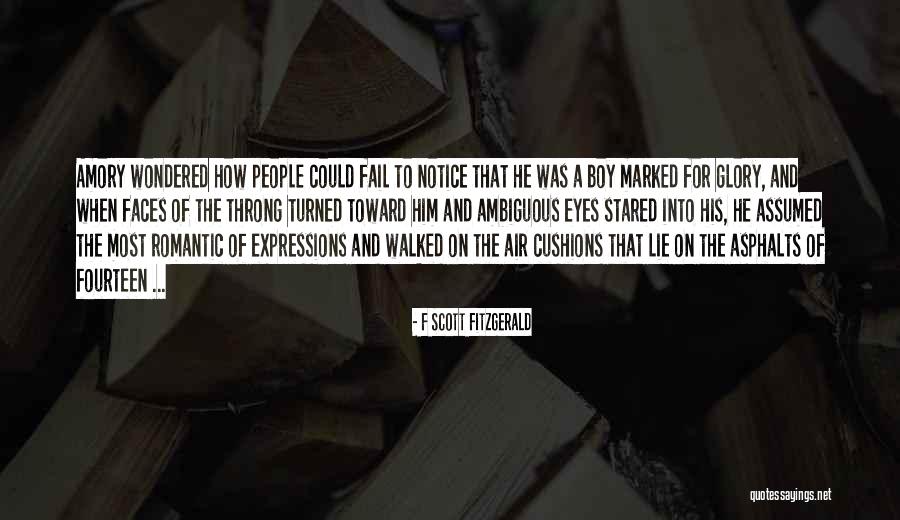
Amory wondered how people could fail to notice that he was a boy marked for glory, and when faces of the throng turned toward him and ambiguous eyes stared into his, he assumed the most romantic of expressions and walked on the air cushions that lie on the asphalts of fourteen ... — F Scott Fitzgerald
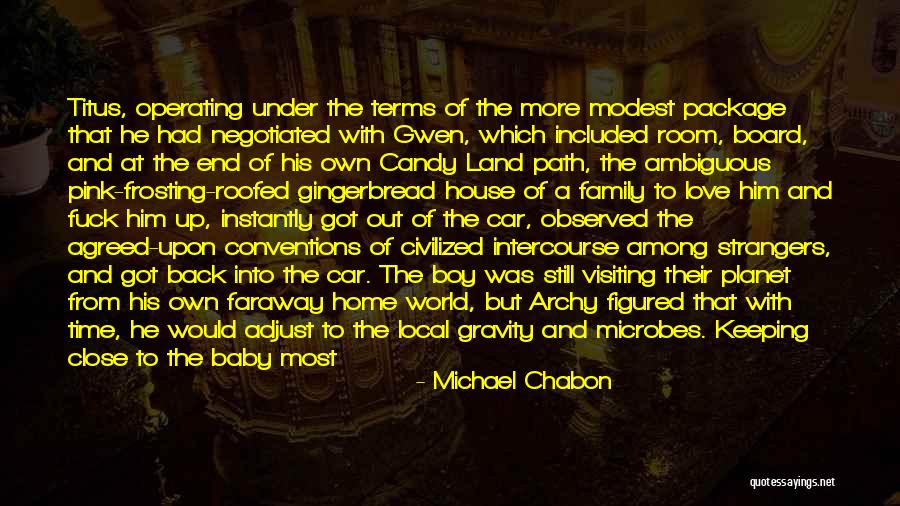
Titus, operating under the terms of the more modest package that he had negotiated with Gwen, which included room, board, and at the end of his own Candy Land path, the ambiguous pink-frosting-roofed gingerbread house of a family to love him and fuck him up, instantly got out of the car, observed the agreed-upon conventions of civilized intercourse among strangers, and got back into the car. The boy was still visiting their planet from his own faraway home world, but Archy figured that with time, he would adjust to the local gravity and microbes. Keeping close to the baby most of the time, as if Clark were the object he had crossed the stellar void to study. — Michael Chabon

Most thoughtful,"...[he said] politely. This cheerfulness was ambiguous, Had she determined to ignore ...[the] coup entirely--an established tactic, most irritating to the innovator but hard to sustain over long periods of time--or had she already evolved her counter-strategy? — Tom Holt
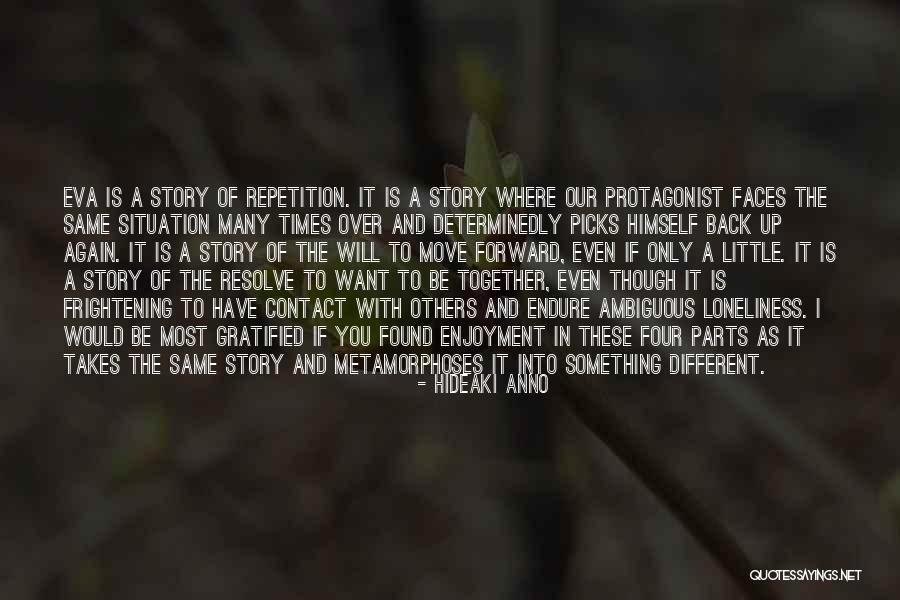
Eva is a story of repetition. It is a story where our protagonist faces the same situation many times over and determinedly picks himself back up again. It is a story of the will to move forward, even if only a little. It is a story of the resolve to want to be together, even though it is frightening to have contact with others and endure ambiguous loneliness. I would be most gratified if you found enjoyment in these four parts as it takes the same story and metamorphoses it into something different. — Hideaki Anno
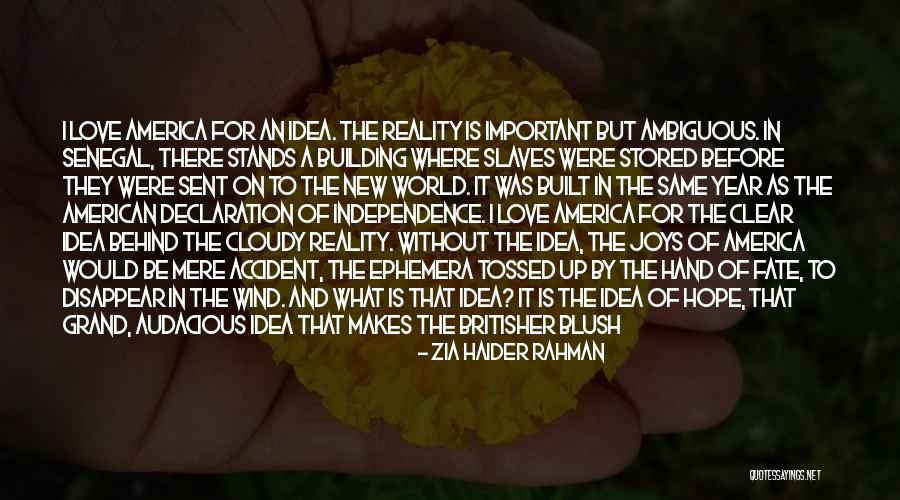
I love America for an idea. The reality is important but ambiguous. In Senegal, there stands a building where slaves were stored before they were sent on to the New World. It was built in the same year as the American Declaration of Independence. I love America for the clear idea behind the cloudy reality. Without the idea, the joys of America would be mere accident, the ephemera tossed up by the hand of fate, to disappear in the wind. And what is that idea? It is the idea of hope, that grand, audacious idea that makes the Britisher blush with embarrassment. It may be an idea not everyone cares for, but it is one I need, I want. I love her for her thought, first, of where you're going, not where you're from; for her majestic optimism against the gray resistances of Europe, most pure in Britain, so that in America I feel like - I am - a sexual being. — Zia Haider Rahman

Pretty quickly, I stopped seeing the company as an engine of community. Instead, I saw it as a mythmaker offering only an illusion of belonging and meeting its customers' desire for connections in form, maybe, but surely not in substance. Once I came to this conclusion, I started to dig deeper into the company's other promises
great working conditions, musical discovery, fair treatment of farmer, and concern for the environment. Every time I went excavating, the stories turned out to be more complex, more heavily edited, and more ambiguous than I had first thought. Each time, it became clear that Starbucks fulfilled its many promises only in the thinnest, most transitory of ways and that people's desires went largely unfulfilled. — Bryant Simon
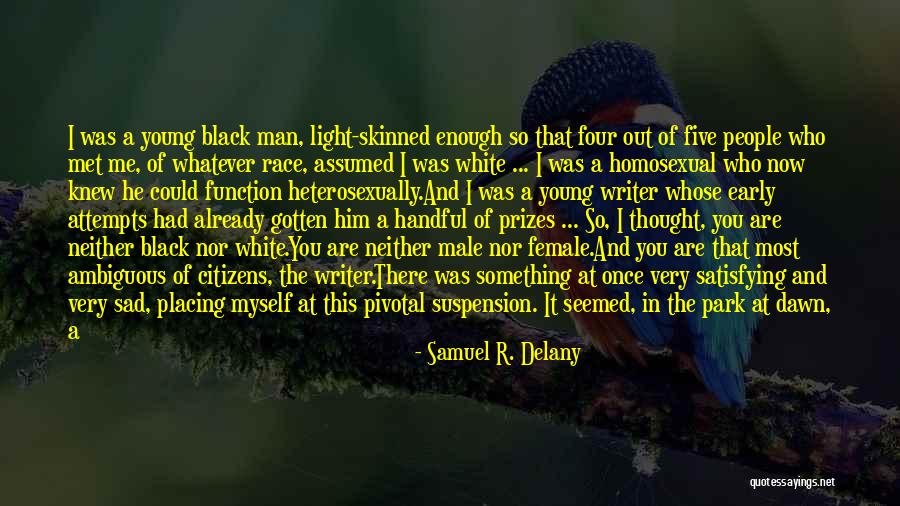
I was a young black man, light-skinned enough so that four out of five people who met me, of whatever race, assumed I was white ... I was a homosexual who now knew he could function heterosexually.
And I was a young writer whose early attempts had already gotten him a handful of prizes ...
So, I thought, you are neither black nor white.
You are neither male nor female.
And you are that most ambiguous of citizens, the writer.
There was something at once very satisfying and very sad, placing myself at this pivotal suspension. It seemed, in the park at dawn, a kind of revelation
a kind of center, formed of a play of ambiguities, from which I might move in any direction. — Samuel R. Delany

In fact, I suspect that our only hope is disaster. Cruel tho' it is to say it, there has got to be a vast die-off in the human population
likely including us and our families
before the survivors find themselves in a world where a new and humble and 'religious' adaptation with nature is possible.
Disaster is not necessary; the better world could be achieved through reason and common sense and a sense of fellowship
but most of the present human world is dead set against us. Thus I was forced to the disagreeable resolutions (not solutions) which I attempted to sketch out in the novel 'Good News.' The title is of course deliberately ambiguous. — Edward Abbey
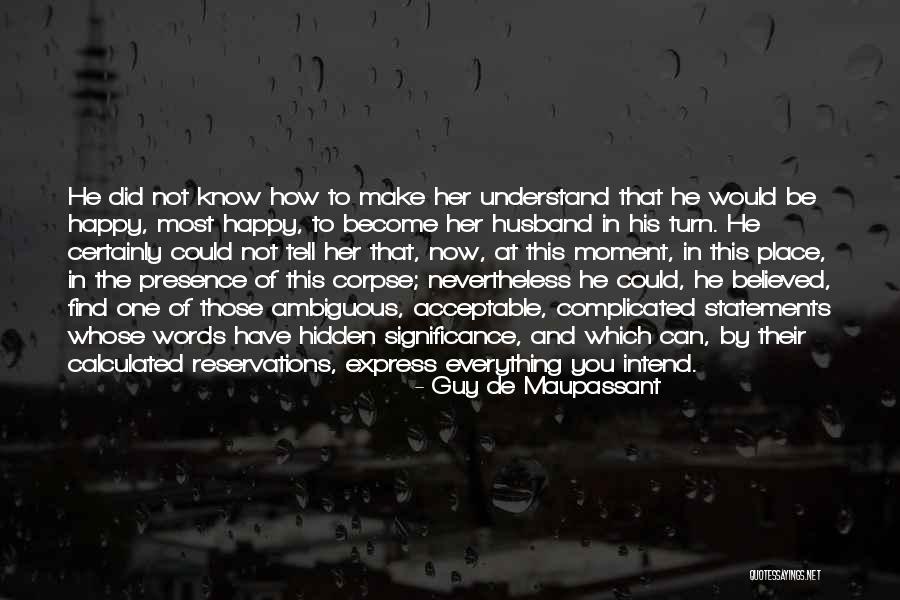
He did not know how to make her understand that he would be happy, most happy, to become her husband in his turn. He certainly could not tell her that, now, at this moment, in this place, in the presence of this corpse; nevertheless he could, he believed, find one of those ambiguous, acceptable, complicated statements whose words have hidden significance, and which can, by their calculated reservations, express everything you intend. — Guy De Maupassant
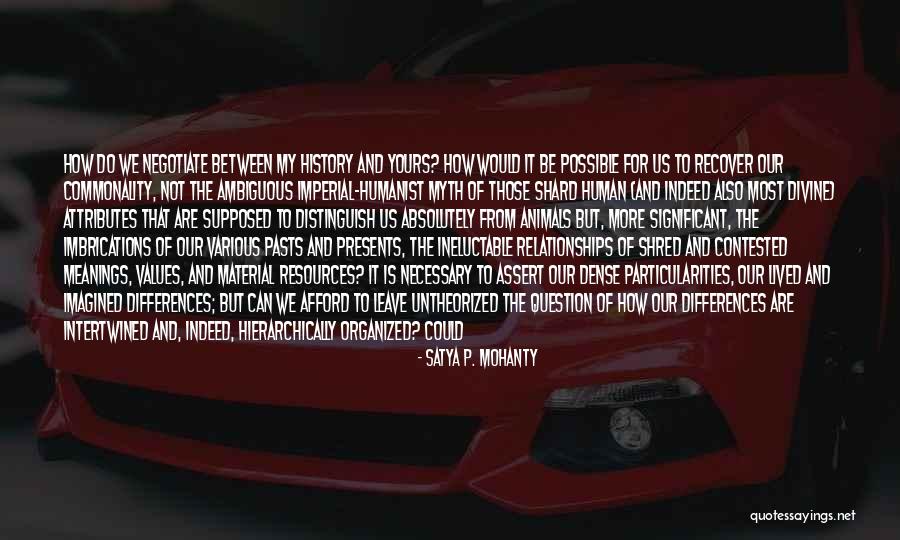
How do we negotiate between my history and yours? How would it be possible for us to recover our commonality, not the ambiguous imperial-humanist myth of those shard human (and indeed also most divine) attributes that are supposed to distinguish us absolutely from animals but, more significant, the imbrications of our various pasts and presents, the ineluctable relationships of shred and contested meanings, values, and material resources? It is necessary to assert our dense particularities, our lived and imagined differences; but can we afford to leave untheorized the question of how our differences are intertwined and, indeed, hierarchically organized? Could we, in other words, afford to have entirely different histories, to see ourselves living - and having lived - in entirely heterogenous and discrete spaces? — Satya P. Mohanty

L'Avventura,' Dad said, 'has the sort of ellipsis ending most American audiences would rather undergo a root canal than be left with, not only because they loathe anything left to the imagination-we're talking about the country that invented spandex-but also because they are a confident, self-assured nation. They know Family. They know Right from Wrong. They know God-many of them attest to daily chats with the man. And the idea that none of us can truly know anything at all-not the lives of our friends or family, not even ourselves-is a thought they'd rather be shot in the arm with their own semi-automatic rifle than face head-on. Personally, I think there's something terrific about not knowing, relinquishing man's feeble attempt to control. When you throw up your hands, say, "Who knows?" you can get on with the sheer gift of being alive. — Marisha Pessl
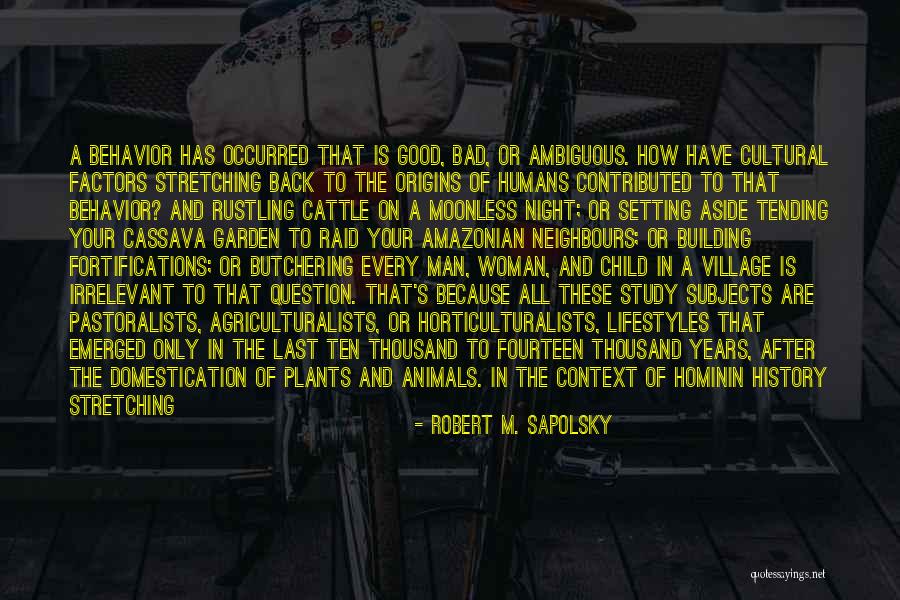
A behavior has occurred that is good, bad, or ambiguous. How have cultural factors stretching back to the origins of humans contributed to that behavior? And rustling cattle on a moonless night; or setting aside tending your cassava garden to raid your Amazonian neighbours; or building fortifications; or butchering every man, woman, and child in a village is irrelevant to that question. That's because all these study subjects are pastoralists, agriculturalists, or horticulturalists, lifestyles that emerged only in the last ten thousand to fourteen thousand years, after the domestication of plants and animals. In the context of hominin history stretching back hundreds of thousands of years, being a camel herder or farmer is nearly as newfangled as being a lobbyist advocating for legal rights for robots. For most of history, humans have been hunter-gatherers, a whole different kettle of fish. — Robert M. Sapolsky

A whole spectrum of possible relationships comes to light, beginning at one pole with the pious and inert quotation that is isolated and set off like an icon, and ending at the other pole with the most ambiguous, disrespectful, parodic-travestying use of a quotation. The transitions between various nuances on this spectrum are to such an extent flexible, vacillating and ambiguous that it is often difficult to decide whether we are confronting a reverent use of a sacred word or more familiar, even parodic playing with it. — Mikhail Bakhtin

The ambiguous role of the car crash needs no elaboration - apart from our own deaths, the car crash is probably the most dramatic event in our lives, and in many cases the two will coincide. Aside from the fact that we generally own or are at the controls of the crashing vehicle, the car crash differs from other disasters in that it involves the most powerfully advertised commercial product of this century, an iconic entity that combines the elements of speed, power, dream and freedom within a highly stylized format that defuses any fears we may have of the inherent dangers of these violent and unstable machines. — J.G. Ballard

Like most people, I feel ambiguous guilt for my inferiors, ambiguous envy for my superiors, and mandatory low-spirits about the system itself. — Martin Amis
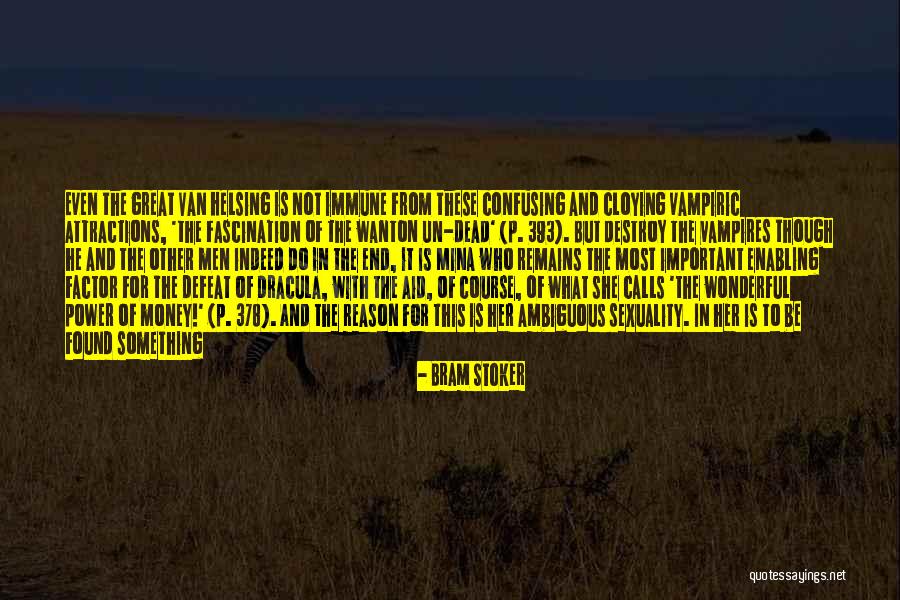
Even the great Van Helsing is not immune from these confusing and cloying vampiric attractions, 'the fascination of the wanton Un-dead' (p. 393). But destroy the vampires though he and the other men indeed do in the end, it is Mina who remains the most important enabling factor for the defeat of Dracula, with the aid, of course, of what she calls 'the wonderful power of money!' (p. 378). And the reason for this is her ambiguous sexuality. In her is to be found something — Bram Stoker
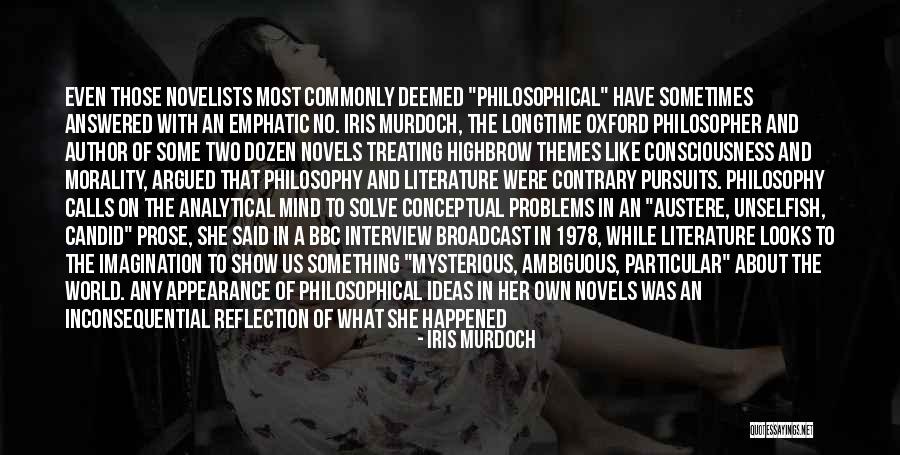
Even those novelists most commonly deemed "philosophical" have sometimes answered with an emphatic no. Iris Murdoch, the longtime Oxford philosopher and author of some two dozen novels treating highbrow themes like consciousness and morality, argued that philosophy and literature were contrary pursuits. Philosophy calls on the analytical mind to solve conceptual problems in an "austere, unselfish, candid" prose, she said in a BBC interview broadcast in 1978, while literature looks to the imagination to show us something "mysterious, ambiguous, particular" about the world. Any appearance of philosophical ideas in her own novels was an inconsequential reflection of what she happened to know. "If I knew about sailing ships I would put in sailing ships," she said. "And in a way, as a novelist, I would rather know about sailing ships than about philosophy. — Iris Murdoch

Being desirable means being comfortable with your own ambiguity. The most ambiguous reality is that we are flesh and spirit at the same time. Within everyone there is light and shadow, good and evil, love and hate. In order to be truthful, you must embrace your total being. A person who exhibits both positive and negative qualities, strengths and weaknesses is not flawed, but complete. — Rumi
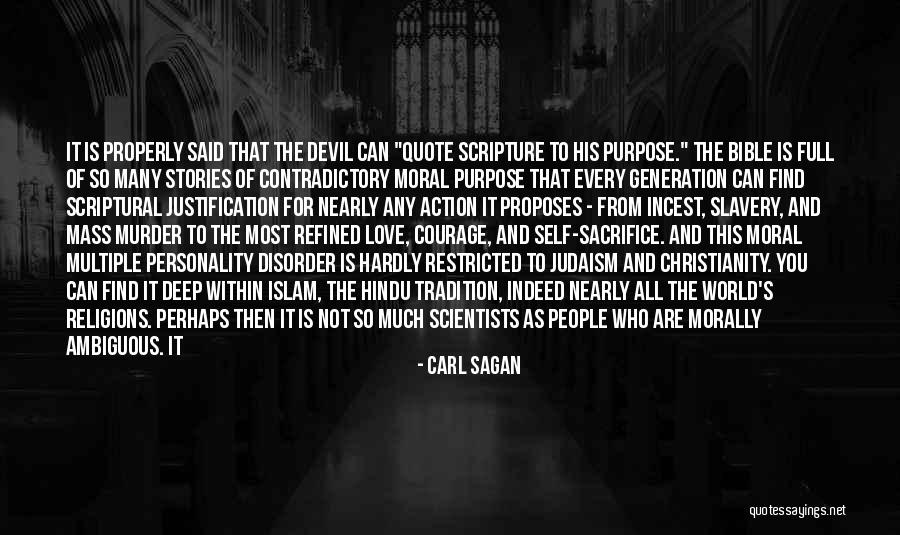
It is properly said that the Devil can "quote Scripture to his purpose." The Bible is full of so many stories of contradictory moral purpose that every generation can find scriptural justification for nearly any action it proposes - from incest, slavery, and mass murder to the most refined love, courage, and self-sacrifice. And this moral multiple personality disorder is hardly restricted to Judaism and Christianity. You can find it deep within Islam, the Hindu tradition, indeed nearly all the world's religions. Perhaps then it is not so much scientists as people who are morally ambiguous. It — Carl Sagan

He has the special quality of virginity, most and least ambiguous of states: ignorance, yet at the same time, power in potentia, and, furthermore, unknowingness, which is not the same as ignorance. — Angela Carter

It's not all 'Jane Eyre' out there. In her sweet, honorable, slightly passive-aggressive way, Jane was as perfect as a protagonist can get while remaining interesting; in fact, she's one of my favorites. But most characters are more morally ambiguous. — Susan Isaacs
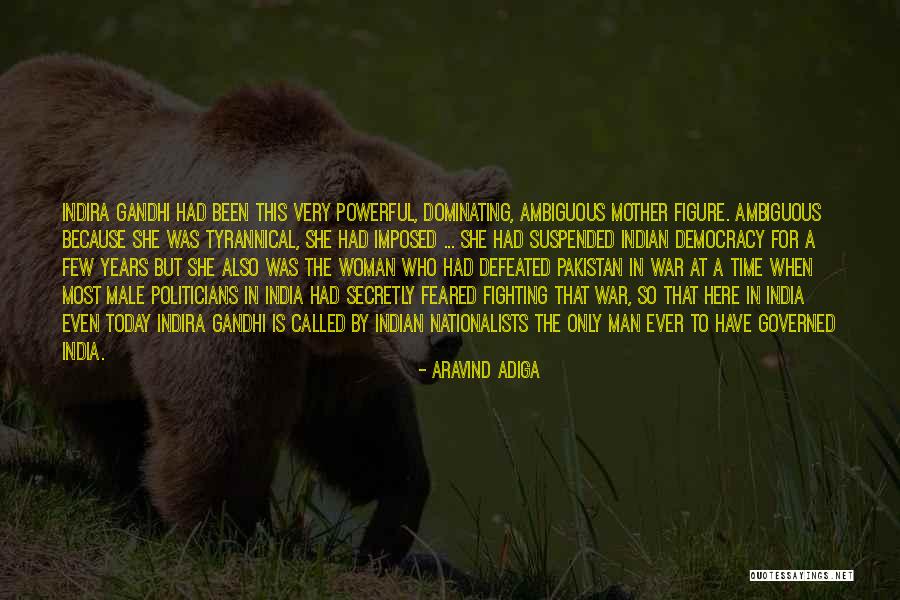
Indira Gandhi had been this very powerful, dominating, ambiguous mother figure. Ambiguous because she was tyrannical, she had imposed ... she had suspended Indian democracy for a few years but she also was the woman who had defeated Pakistan in war at a time when most male politicians in India had secretly feared fighting that war, so that here in India even today Indira Gandhi is called by Indian nationalists the only man ever to have governed India. — Aravind Adiga

The clown figure has had so many meanings in different times and cultures. The jolly, well-loved joker familiar to most people is actually but one aspect of this protean creature. Madmen, hunchbacks, amputees, and other abnormals were once considered natural clowns; they were elected to fulfill a comic role which could allow others to see them as ludicrous rather than as terrible reminders of the forces of disorder in the world. But sometimes a cheerless jester was required to draw attention to this same disorder, as in the case of King Lear's morbid and honest fool, who of course was eventually hanged, and so much for his clownish wisdom. Clowns have often had ambiguous and sometimes contradictory roles to play. ("The Last Feast Of The Harlequin") — Thomas Ligotti

I love the unanswered question, the unresolved story, the unclimbed mountain, the tender shard of an incomplete dream. Most of the time. But is it mandatory for a writer to be ambiguous about everything? Isn't it true that there have been fearful episodes in human history when prudence and discretion would have just been euphemisms for pusillanimity? When caution was actually cowardice? When sophistication was disguised decadence? When circumspection was really a kind of espousal? Isn't it true, or at least theoretically possible, that there are times in the life of a people or a nation when the political climate demands that we - even the most sophisticated of us - overtly take sides? I think such times are upon us. — Arundhati Roy
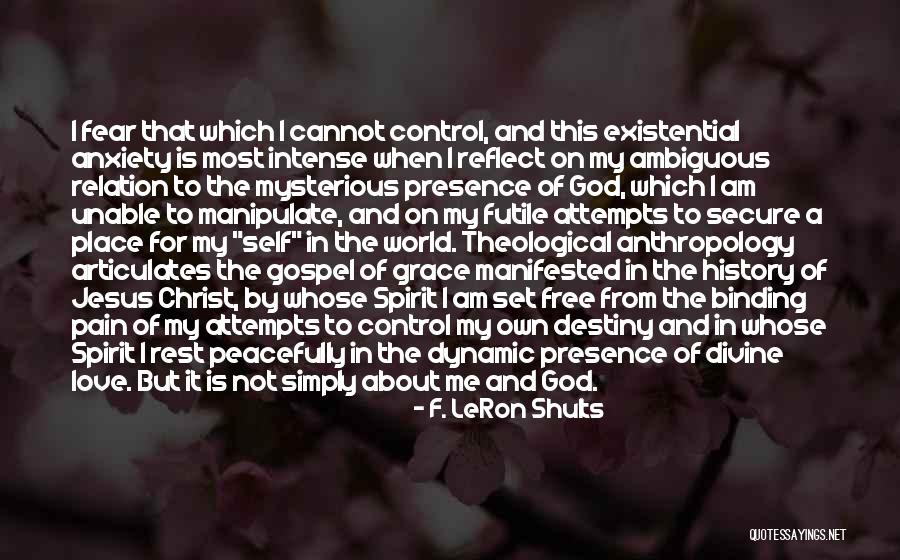
I fear that which I cannot control, and this existential anxiety is most intense when I reflect on my ambiguous relation to the mysterious presence of God, which I am unable to manipulate, and on my futile attempts to secure a place for my "self" in the world. Theological anthropology articulates the gospel of grace manifested in the history of Jesus Christ, by whose Spirit I am set free from the binding pain of my attempts to control my own destiny and in whose Spirit I rest peacefully in the dynamic presence of divine love. But it is not simply about me and God. — F. LeRon Shults
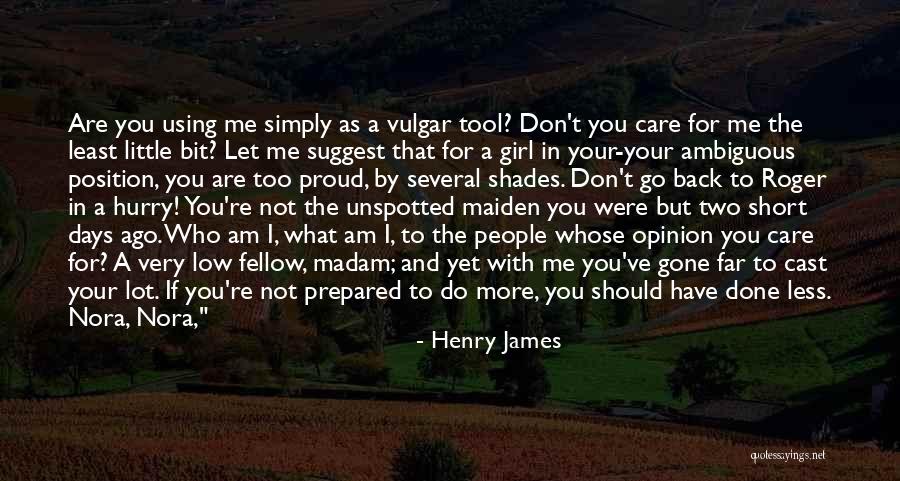
Are you using me simply as a vulgar tool? Don't you care for me the least little bit? Let me suggest that for a girl in your-your ambiguous position, you are too proud, by several shades. Don't go back to Roger in a hurry! You're not the unspotted maiden you were but two short days ago. Who am I, what am I, to the people whose opinion you care for? A very low fellow, madam; and yet with me you've gone far to cast your lot. If you're not prepared to do more, you should have done less.
Nora, Nora," he went on, breaking into a vein none the less revolting for being more ardent, "I confess I don't understand you! But the more you puzzle me the more you fascinate me; and the less you like me the more I love you. What has there been between you and Lawrence? Hang me if I can understand! Are you an angel of purity, or are you the most audacious of flirts? — Henry James

Since the journey is a metaphor - the most ambiguous and seductive of metaphors, we tell ourselves - it can also be born of immobility. There is no need to drag our bodies around so much, all dressed up. It's hot, there are flies, diseases. It is enough to close our eyes, seated on a chair in the shade, to float on the waves of imagination. Isn't that what books are there for? — Dacia Maraini
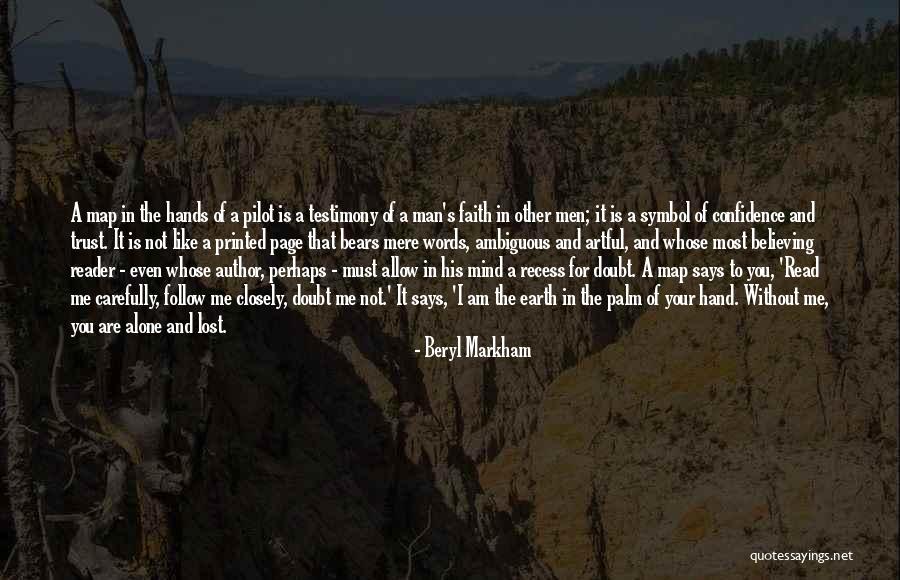
A map in the hands of a pilot is a testimony of a man's faith in other men; it is a symbol of confidence and trust. It is not like a printed page that bears mere words, ambiguous and artful, and whose most believing reader - even whose author, perhaps - must allow in his mind a recess for doubt. A map says to you, 'Read me carefully, follow me closely, doubt me not.' It says, 'I am the earth in the palm of your hand. Without me, you are alone and lost. — Beryl Markham
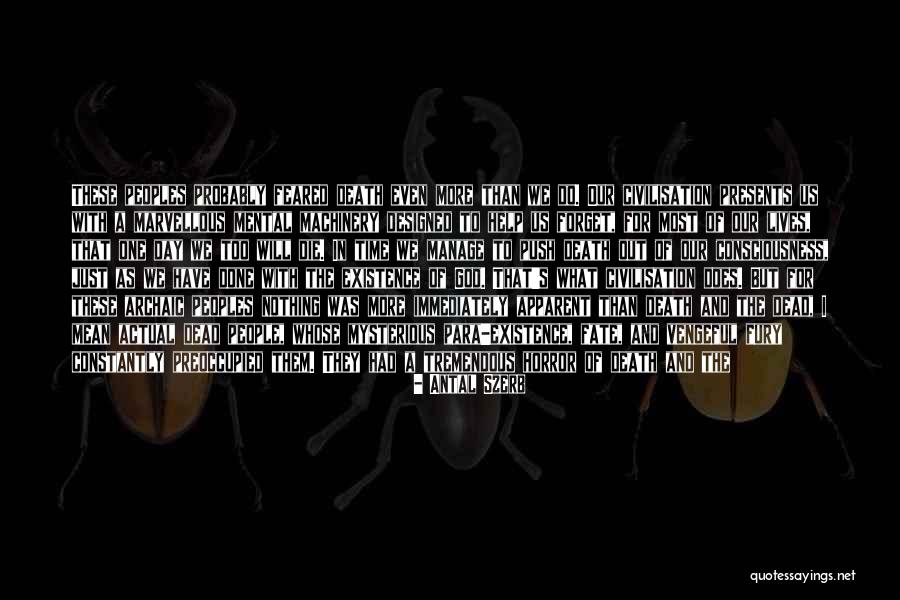
These peoples probably feared death even more than we do. Our civilisation presents us with a marvellous mental machinery designed to help us forget, for most of our lives, that one day we too will die. In time we manage to push death out of our consciousness, just as we have done with the existence of God. That's what civilisation does. But for these archaic peoples nothing was more immediately apparent than death and the dead, I mean actual dead people, whose mysterious para-existence, fate, and vengeful fury constantly preoccupied them. They had a tremendous horror of death and the dead. But then of course in their minds everything was more ambiguous than it is for us. Opposites sat much closer. The fear of death and the desire for death were intimately juxtaposed in their minds, and the fear was often a form of desire, the desire a form of fear. — Antal Szerb
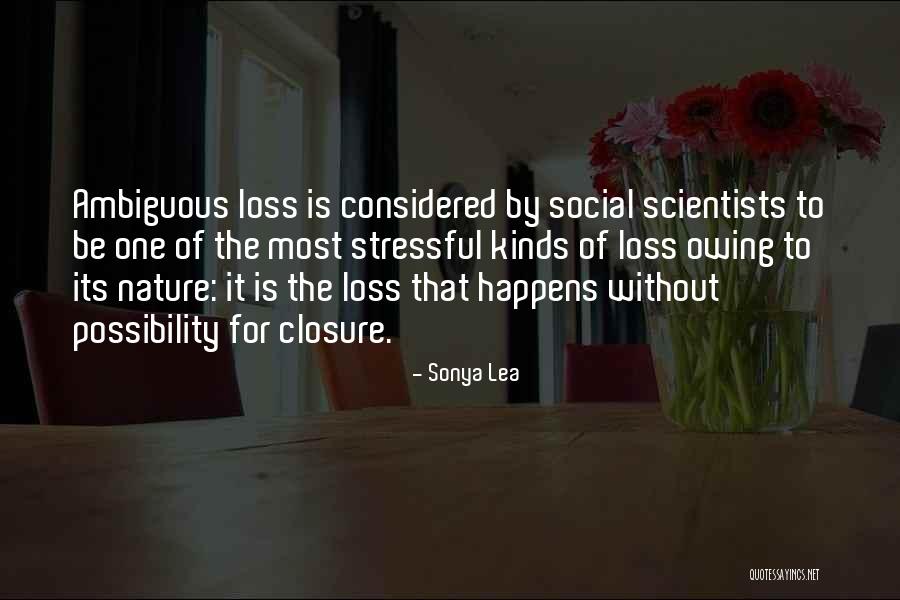
Ambiguous loss is considered by social scientists to be one of the most stressful kinds of loss owing to its nature: it is the loss that happens without possibility for closure. — Sonya Lea
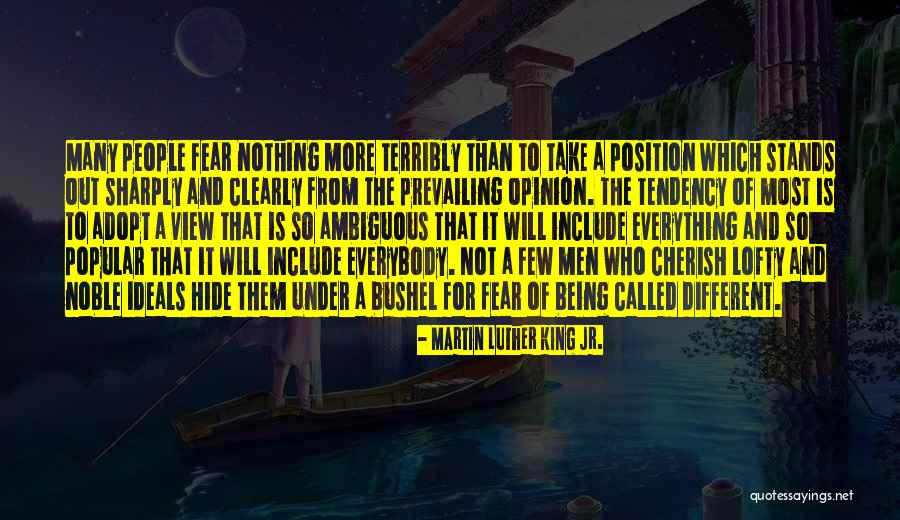
Many people fear nothing more terribly than to take a position which stands out sharply and clearly from the prevailing opinion. The tendency of most is to adopt a view that is so ambiguous that it will include everything and so popular that it will include everybody. Not a few men who cherish lofty and noble ideals hide them under a bushel for fear of being called different. — Martin Luther King Jr.





